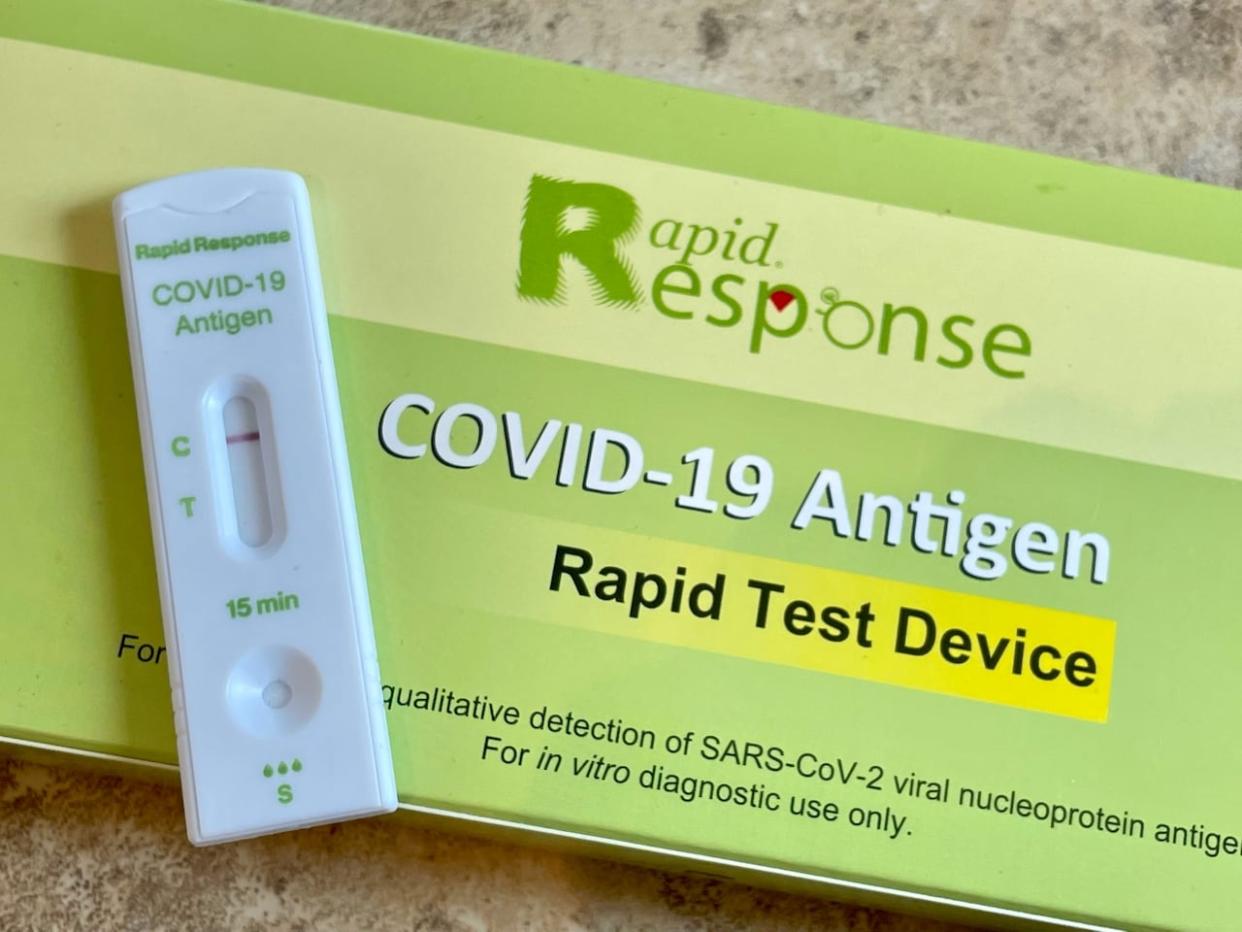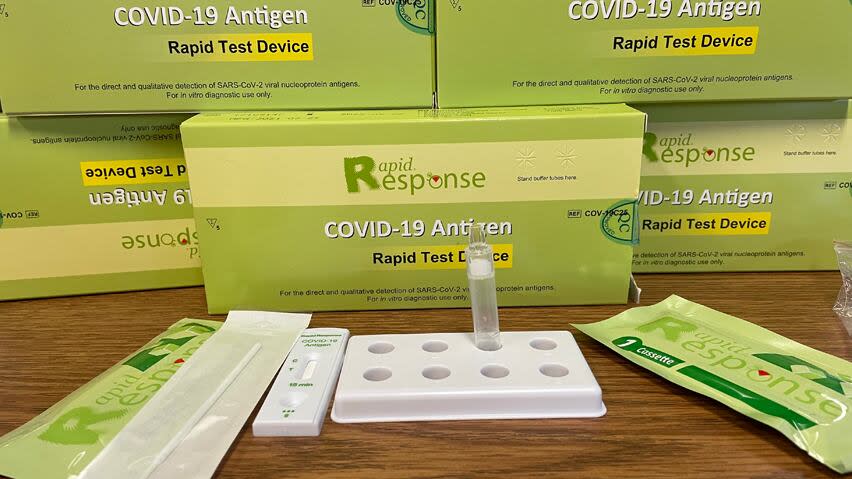New Brunswick mulls future of COVID-19 rapid tests, as virus kills 2, hospitalizes child under 4

New Brunswick is mulling the future of its COVID-19 rapid point-of-care testing program, as the virus claimed two more lives and hospitalized 17 people, including a child under four.
"Demand for rapid tests has been steadily declining since last fall, and the province is currently determining its next steps with regards to the COVID-19 tests," said Department of Health spokesperson Sean Hatchard.
He made the comment in response to questions from CBC News about how much longer the province will continue to offer free rapid test kits and whether it's considering phasing them out.
Hatchard did not provide any statistics for rapid test demand or respond to questions about what other factors the province will weigh in its decision.
New Brunswick has an "adequate" supply of the tests, which people can use at home to screen for the virus within 15 minutes, said Hatchard. He did not say how many, nor did he say whether the province plans to order any more.
Set to expire in September
He did say rapid tests in the province's inventory are currently set to expire in September, and do not have a shelf life extension past the expiry date printed on the box.
Health Canada does not recommend using expired rapid antigen tests.
The authorized shelf life is the amount of time for which the manufacturer has provided scientific evidence to support the conclusion that the product will continue to perform as intended, a spokesperson has said. Results of an expired test may not always be accurate.

Health Canada does not recommend using expired tests. (Submitted by the Department of Health)
"For tests that expire in its warehouses, New Brunswick has a process to ensure safe, economically and environmentally responsible destruction," said Hatchard.
People with rapid tests at home should monitor the expiry date on the packaging, he advised. Expired tests can be safely discarded in household waste, he said.
'Not everyone needs to be tested'
"It's important to note that not everyone needs to be tested," said Hatchard. "For the general public, anyone feeling unwell should stay at home while sick and until symptoms improve."
Public Health recommends rapid tests for people who are at higher risk of severe illness and who would consider treatment, as well as those who work in vulnerable settings, according to the province's COVID-19 website.
Asked how those people will know they're positive if free rapid tests are no longer offered, and how people will know how to time their COVID-19 vaccine six months after their last dose or infection if they aren't able to rapid test, Hatchard said polymerase chain reaction (PCR) lab tests are available, with referral from a physician or nurse practitioner, for people who are eligible for Paxlovid treatment.
Paxlovid is used for people with mild to moderate COVID-19 who are at high risk of progressing to serious illness, such as older adults, people with chronic medical conditions and those who are moderately to severely immunocompromised due to a medical condition or treatment. To be effective, it must be taken within five days of developing symptoms.
Rapid tests are still available for pick up at sites across the province's seven health zones, such as libraries, municipalities and regional health authorities' facilities, said Hatchard.
While most pick-up sites require an appointment, several sites may offer tests without an appointment time, depending on their staffing levels and hours of operation, he said.
COVID activity 'moderate'
COVID-19 activity remains "moderate," according to the latest Respiratory Watch report. "Most indicators remained stable during the current reporting period," April 14 to April 20, it says.
The two people who died from COVID-19 during the reporting week were both aged 65 or older, the report shows.
Their deaths raise the provincial pandemic total to at least 1,032. The actual number is unclear because the Department of Health counts only people who die in hospital as COVID deaths.
The 17 people hospitalized for or with COVID is down one from the previous report. One person required intensive care, up from none.
In addition to the child under four, two people aged 45 to 64 were admitted to hospital, and 14 people aged 65 or older, including the one in ICU.

A total of 1,487 people have now been hospitalized for or with COVID-19 since the respiratory season began on Aug. 27, 95 of whom required intensive care, while the flu has sent 545 to hospital, with 50 of them admitted to ICU. (Chris Young/The Canadian Press)
Two lab-confirmed COVID outbreaks were declared, the same number as the previous week. Both were in facilities described only as "other."
There were 31 new cases of COVID confirmed through PCR lab tests, up from 27 in the previous report.
The positivity rate — or the percentage of lab tests performed that produced a positive result — increased to four per cent, from three.
More than 1,900 COVID-19 vaccines were administered in the past week, raising the total to 153,645 shots since Oct. 4, the Department of Health said.
Spring boosters have been available since April 2 to New Brunswickers considered most at risk of severe illness. The spring doses will be available until June 15, the department has said.
Flu sends child, youth to hospital
Influenza activity remained "relatively stable" between April 14 and April 20, the report says.
No one died from the flu, but the flu sent six people to hospital, up from five a week earlier.
Among those hospitalized were a child under four, a youth aged five to 19, one person aged 20 to 44, two people aged 45 to 64 and one aged 65 or older.
No flu outbreaks were reported, unchanged, and no influenza-like illness outbreaks in schools, down from two.
Lab tests confirmed 59 new flu cases during the reporting week, including four influenza A and 55 influenza B. That's down from 74.
The positivity rate is seven per cent, down from eight.
There have been 3,584 confirmed flu cases since the respiratory season began on Aug. 27.
A total of 223,963 New Brunswickers have been vaccinated against the flu this season, as of Tuesday, according to figures from the department. That an increase of 765 from a week ago.
Vitalité updates monthly report
Vitalité Health Network has 15 hospitalized COVID-19 patients, as of Saturday, according to its monthly report update.
That's up 150 per cent from the six COVID patients it had in March.
Eight health-care workers are off the job, after they tested positive for COVID-19, nearly a 47 per cent drop from the 15 infected employees a month ago.
Vitalité hasn't updated its COVID outbreaks page since April 22. At that time, it had two outbreaks, both at the Chaleur Regional Hospital in Bathurst, on the general medical unit and the extended care unit (4W).
Horizon Health Network reports 10 active COVID admissions, as of Saturday, down from 15 in its previous weekly report. One person requires intensive care, unchanged.
Only one employee is off sick with COVID, down from three.
Horizon has one COVID-19 outbreak, as of Monday, at the Ridgewood Veterans Wing in Saint John.


